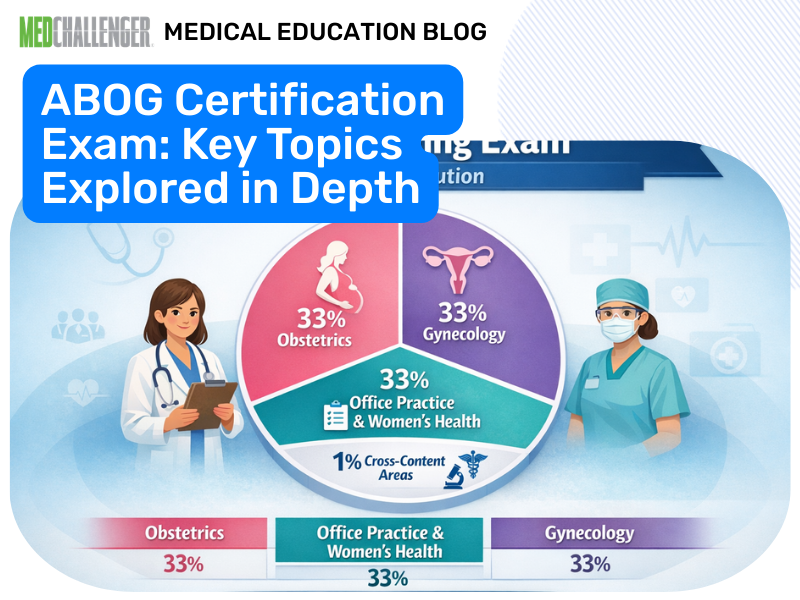ABP General Pediatrics Certifying Exam 2025: How to Prepare and Pass
A complete guide to the ABP General Pediatrics Certifying Exam, including eligibility, registration deadlines, exam format, content outline, scoring.
Prep confidently for the ABOG Exam with our comprehensive guide. Explore exam structure and key topics to help you succeed in becoming a certified OBGYN.

Embarking on the journey to become a certified OBGYN physician is both exciting and challenging. The ABOG Certifying Exam is a pivotal milestone in this process, testing your knowledge and readiness to provide exceptional care to women throughout their lives. This guide aims to streamline your study process by outlining the exam structure, key topics, and effective study strategies to help you succeed with confidence.
The American Board of Obstetrics and Gynecology (ABOG) Certifying Exam assesses your comprehensive understanding of obstetrics and gynecology. Here's what you need to know about the exam format:

Understanding this structure will help you allocate your study time effectively across different subject areas. The ABOG Board Exam: A Comprehensive Guide will also give you additional need-to-know details about the exam.
Routine Prenatal Care Management
Management of Co-existing Medical Conditions
Genetic Testing and Counseling
Example Scenario: A 28-year-old pregnant woman at 12 weeks gestation presents for her first prenatal visit. She has a history of Type 1 Diabetes. What adjustments should be made to her prenatal care plan to ensure optimal maternal and fetal outcomes?
Antepartum Fetal Assessment
Preterm Delivery Risk Management
Common Antepartum Complications
Pregnancy-Specific Medical Disorders
Infectious Diseases in Pregnancy
Operative Vaginal and Caesarean Delivery
Obstetric Laceration Repair
Labor Induction and Augmentation
Management of Obstetric Hemorrhage
Fetal Heart Rate (FHR) Abnormalities

Routine Postpartum Care
Postpartum Complications
Ongoing Management of Medical Conditions
Example Question: What are the recommended interventions for a patient presenting with signs of postpartum depression six weeks after delivery? Discuss both pharmacological and non-pharmacological approaches.
These types of examination questions and more can be found in the Med-Challenger OBGYN: ABOG Board Review with CME Credits. There are close to 1,000 practice questions that will have you more than ready for the exam. Subscriptions are budget-friendly at only $26.
Preoperative Evaluation
Perioperative Infection Prevention
Postoperative Care and Complications
Check out the ABOG Examination Bulletin for more detailed information on the exam.
Acute Pelvic Pain
Pelvic Inflammatory Disease (PID)
Ectopic Pregnancy
Example Scenario: A 24-year-old woman presents with sudden-onset lower abdominal pain and nausea. An ultrasound reveals an enlarged, edematous ovary. What is your next step in management?
Minimally Invasive Procedures
Gynecologic Surgeries for Benign Disorders
Pelvic Floor Disorder Surgeries
Intraoperative Findings of Neoplasia
Genetic Risks and Counseling
Age-Appropriate Health Screening
Immunizations
Genetic Screening and Cancer Prevention
Wellness Counseling
Family Planning
Care for Patients with Unique Needs
Example Question: How would you counsel a 35-year-old woman with a family history of breast cancer about her screening options and preventative measures?
Prioritize High-Yield Topics
Utilize Practice Exams and Question Banks
Engage with Clinical Scenarios
Stay Updated with Latest Guidelines
Join Study Groups and Discussions
Enroll in comprehensive review courses, such as Med-Challenger OBGYN Boards Prep Course, that offer structured learning and expert guidance.
Preparing for the ABOG Certifying Exam is a significant undertaking, but with structured preparation and dedicated effort, you can approach the exam with confidence. Remember to balance your studies with self-care, stay connected with your support system, and keep your ultimate goal in sight: providing exceptional care to women at all stages of life. Believe in your abilities, stay persistent, and success will follow.
Wishing you the best of luck on your journey to becoming a board-certified OBGYN physician!
For easy, low-cost personal medical education subscriptions that include board's prep, MOC, and CME requirements, Med-Challenger has you covered in Family Medicine, Emergency Medicine, Internal Medicine, Pediatrics, Pediatric Emergency Medicine, OBGYN, Physician Assistants, and Nurse Practitioners
Follow & message us on social media to receive a discount on your subscription
A complete guide to the ABP General Pediatrics Certifying Exam, including eligibility, registration deadlines, exam format, content outline, scoring.
ABEM is replacing the Oral Exam with a new Certifying Exam in 2026. What’s changing, from OSCE-style stations to clinical care cases, and how to...
The ABP is implementing changes to the exam blueprint for the General Pediatrics Certification Exam, effective October 2024.
Stay informed of new medical education content, certification requirements and deadlines, case-based CME quizzes, and special offers.